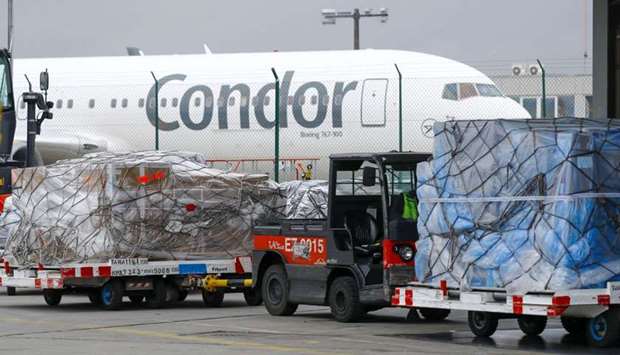Pandemic-induced crisis continues to be devastating and unrelenting for the global economy, aviation industry in particular.
The Covid-19 crisis literally challenged the industry for its very survival this year. In the face of a half trillion-dollar revenue drop (from $838bn in 2019 to $328bn so far in 2020) airlines have cut costs by $365bn (from $795bn in 2019 to $430bn in 2020), according to data provided by the International Air Transport Association.
The silver lining, however, is that air cargo is performing better than the passenger business. It could not, however, make up for the fall in passenger revenue.
But it has become a significantly larger part of airline revenues and cargo revenues are making it possible for airlines to sustain their skeleton international networks amid the crisis.
Air cargo has supported global supply chains and should recover 2019 levels next year, but air travel will take several years.
Air cargo uplift is expected to be 54.2mn tonnes in 2020, down from 61.3mn tonnes in 2019.
Operational parameters for cargo are performing significantly better than for passenger but are still depressed compared to 2019.
Certainly, air cargo revenues are bucking the trend, increasing to $117.7bn this year from $102.4bn in 2019.
A 45% fall in overall capacity, driven largely by the precipitous fall in passenger demand which took out critical belly capacity for cargo (-24%), pushed yields up by 30% in 2020.
In 2019, air cargo accounted for 12% of revenues and that is expected to grow to 36% in 2020.
In 2021, the cargo side of the business is expected to continue with strong performance. Improved business confidence and the important role that air cargo should play in vaccine distribution is expected to see cargo volumes grow to 61.2mn tonnes (up from 54.2mn tonnes in 2020 and essentially matching the 61.3mn tonnes carried in 2019).
A continued capacity crunch due to the slow reintroduction of belly capacity from passenger services combined with a higher proportion of time and temperature sensitive cargo (vaccines) will see a further 5% increase in yields. This will contribute to strong performance in cargo revenues which are expected to grow to an historic high of $139.8bn.
Air transport is a vital feature of modern, globalised world, connecting people and businesses across oceans and continents.
Undoubtedly, air transport is vital for international trade in manufactured goods, particularly the components industry that accounts for a major part of cross border trade today.
IATA forecasts that the value of international trade shipped by air this year will be $5.8tn, 10% lower compared to 2019. However, it will above the 2019 levels in 2021.
As the pandemic-hit world eagerly awaits the global distribution of vaccines, air cargo operators may struggle to distribute them, experts have cautioned.
The warning came in vaccine transport guidelines issued by the International Air Transport Association, which is pushing governments to replace travel curbs and quarantines with testing.
There are currently more than 100 Covid-19 vaccine candidates under development, with a number of these in the human trial phase, according to the World Health Organisation.
As WHO and partners work together on the response – tracking the pandemic, advising on critical interventions, distributing vital medical supplies to those in need – they are racing to find a vaccine.
The expected vaccine roll-out in the next few weeks, however, poses new challenges for the aviation industry.
Reaching the vaccine to billions of people around the world is a gigantic task.
“If borders remain closed, travel curtailed, fleets grounded and employees furloughed, the capacity to deliver life-saving vaccines will be very much compromised,” IATA said.
Widespread grounding of passenger flights that normally carry 45% of global cargo in their holds has taken out capacity, thinning the air freight network and driving up prices.
The potential size of the delivery is enormous, IATA points out. Just providing a single dose to 7.8bn people would fill 8,000 747 (jumbo) cargo aircraft!
Land transport will certainly help, especially in developed economies with local manufacturing capacity. But vaccines cannot be delivered globally without the significant use of air cargo.
Air cargo, therefore, plays a key role in vaccine distribution through well-established global time – and temperature-sensitive supply systems in the best conditions, using cutting-edge technologies and procedures.
The one true trade facilitator that contributes to global economic development and creates millions of jobs is the air cargo industry.
The global economy depends heavily on air cargo industry’s ability to deliver high-quality products at competitive prices to consumers worldwide.
* Pratap John is Business Editor at Gulf Times. Twitter handle: @PratapJohn


